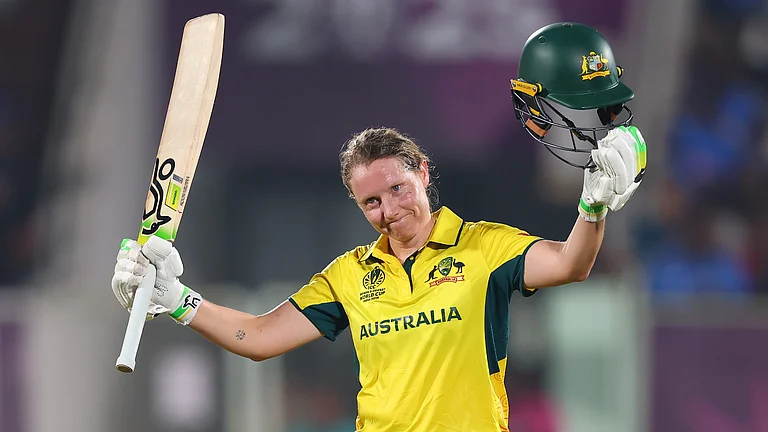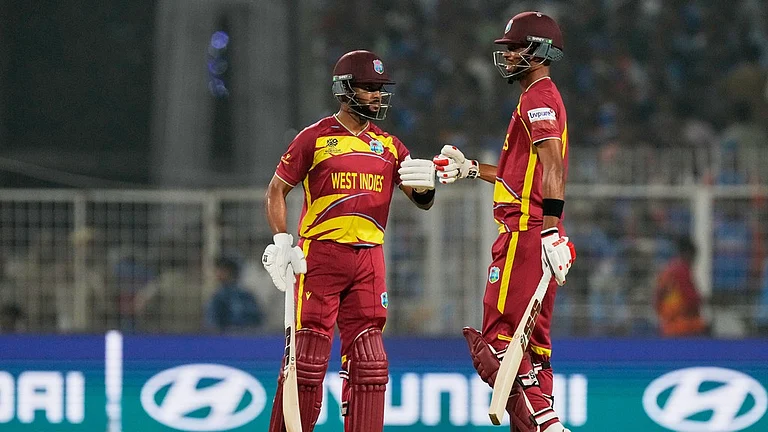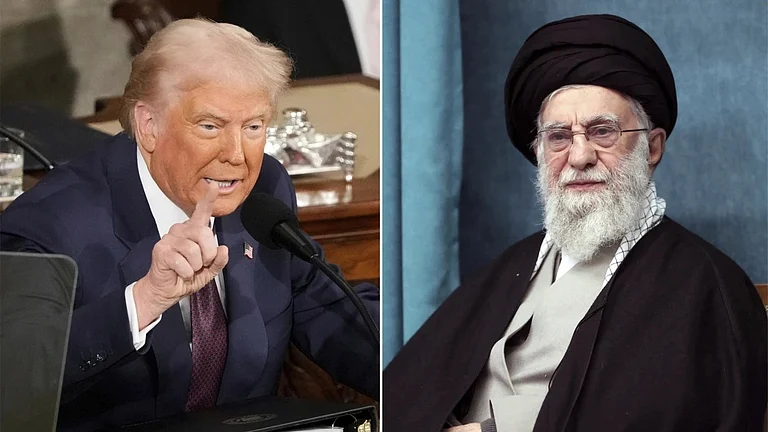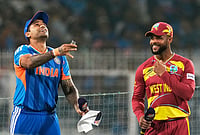On September 13, 2023, around two months before the state Assembly elections in Madhya Pradesh, a new ‘‘film poster’’ appeared across Bhopal. It featured a man wearing military camouflage—his face and wrists wrapped in bandages—bearing stark similarities to Shah Rukh Khan in the poster of 'Jawan'. A close look though revealed three key differences. First, the man on the poster: not Khan but Kamal Nath, the state’s ex-chief minister. Then, the movie’s name, Corruption ka Haiwan, followed by the director’s: “Corruptionnath”.
Since Indian politics can be more melodramatic than Bollywood melodramas, this wasn’t their only recent interaction. On the same day, talking to a reporter, Delhi Chief Minister Arvind Kejriwal said, “Have you seen 'Jawan'? In it, Shah Rukh Khan says to not give votes on the basis of caste and religion, instead ask the politicians if they’d give good education and medical care. Only the Aam Aadmi Party (AAP) asks for votes on the promise of providing education to children.” If these two examples (out of many) show how Indian politicians appropriate Hindi cinema, then its filmmakers have returned the favour with similar flair, making enough movies on politicians, where the nuances of their origins—the electoral process—are missing.
This lack seems surprising. Bollywood directors have obsessed over (corrupt) politicians for long and the narrative of an Indian election—blending rivalries, chaos, and victors—has an in-built three-act structure, packing in enough ‘masala’ to satiate viewers. So over the last decade, following the dominant trend, filmmakers have captured that dramatic wattage in a language that comes naturally to them. In Thalaivi (2021), Raees (2017) and Bhoothnath Returns (2014), election campaigns come alive through charged songs. Cinematographic flourish, too, heightens the tension: via wide shots of politicians’ rousing speeches [Raajneeti (2010) and Madam Chief Minister (2021)] or close-up shots of inked index fingers [Gulaab Gang (2014) and Dasvi (2022)]. Some films, such as Thalaivi, concentrate so much on the theatrics of the election campaigns and their protagonists that the ends (political power) dwarf the means (the voters).
But none of these movies capture the granular detail of the electoral drama. Because they impose spectacle on the scenes of elections, as opposed to it organically emerging from the elections themselves. Beyond the ambit of the mainstream however, two Hindi films, a satire and a documentary, have shown the immense possibilities of this subgenre: Newton (2017) and An Insignificant Man (2017).

The former tells the story of a government clerk, Newton (Rajkummar Rao), sent to conduct polls in a ‘‘Naxal-infested’’ village in Chhattisgarh. Unlike most panoramic sweeps of Bollywood elections, Newton shows the ant’s-eye-view of democracy. It doesn’t bemoan the corrupt “System” either; instead, it deals in people: noble, venal, indifferent. And by probing the psyche of ordinary individuals—each reacting to their own histories, prejudices and preferences—it teases out the democratic, moral and philosophical dimensions of Indian elections. It also interrogates the meanings of ‘‘One Nation’’ (when Newton’s assistant, Malko, a local school teacher, tells him that the villagers “want independence—from both”, the State and the Maoists) and ‘‘One Election’’ (when she tells him that the villagers, pressured to vote, are seeing the parties’ symbols for the first time).
An Insignificant Man, following Kejriwal and other party members for close to a year, captures the heady idealism of AAP’s initial days. Structured like a thriller—the title cards, at different points, function as countdowns to the 2013 climactic election—it presents an immersive account of a fledgling political movement and the electorate’s desire for change. The latter gives the movie its most poignant moments. At one point, a woman pledges her support for the party. What does she want? “Aadhar and ration cards.”
Newton was a box-office hit; An Insignificant Man released in theatres—a rare feat for an Indian documentary—and had an eight-week national theatrical run. These two movies across different mediums show that meaningful political dramas, centred on elections, can be commerical successes. So why has Bollywood, over the decades, failed to capture its nuances? “Because nobody has attempted it,” says Newton’s director, Amit Masurkar. “Sometimes people have ideas, but they feel it doesn’t have a market. So they try to replicate successful models.” Less than two years after Newton’s release, Mammootty-starrer Unda—centred on the Kerala police in Maoist-dominated Chhattisgarh for election duty—hit the theatres to widespread critical acclaim.

“It’s not just elections,” says the director of An Insignificant Man, Vinay Shukla. “Hindi cinema hasn’t really gotten into the mechanisms or institutions that much. So, for instance, we haven’t made a good medical drama set inside a hospital.” He cites the example of Court (2014), a “fantastic” film diving into the “minutiae of courtroom proceedings”, which was an impressive “reading of our society”. Court unpacks what was long considered an opaque and callous “System” through complex and flawed individuals. (In fact, countless Hindi films have shown the legal world in such a simplistic light that many movie watchers may mistakenly believe that witnesses in courts take oaths by touching the Bhagavad Gita!)
Many political dramas in Bollywood (where elections serve an ornamental purpose) have often pinned the blame on varied “Systems” and their vile embodiments. This two-pronged, contradictory tension—being political yet apolitical—further inhibits the representation of electoral realities. “A lot of [film industry] people just wanted to play safe,” says Shukla, referring to the movies of the 1980s and the 1990s. “You had a lot of cash flowing into the business. But when your source of funding was itself questionable, nobody wanted to be caught on the wrong foot.” The simplistic portrayals of villains, flourishing even in the subsequent decades, also produced dramas favouring ‘‘mobocracy’’, where vigilante justice is the only justice. Analysing Hindi films on elections in The Great March of Democracy (ed. S Y Quraishi, 2019), Meghnad Desai notes that their “depiction of politics”, from the 1960s to 2010, has “become much more violent” but has been “increasingly emptied of ideology”.
Besides, a film industry devoted to the exclusive currency of select stars can hardly be interested in democracy. So, numerous Bollywood movies dealing with the cruelties of the political machinery often seek refuge in a generic saviour who ‘‘liberates’’ the masses. It’s perhaps why Khan’s climactic monologue in Jawan, telling people to vote responsibly, comes only after he has solved all the problems. In that sense, Hindi filmmakers and Indian politicians share a distinct similarity—that, despite their endless assertions, they care very little for those they claim to serve: the aam aadmi.
(Views expressed are personal)


























